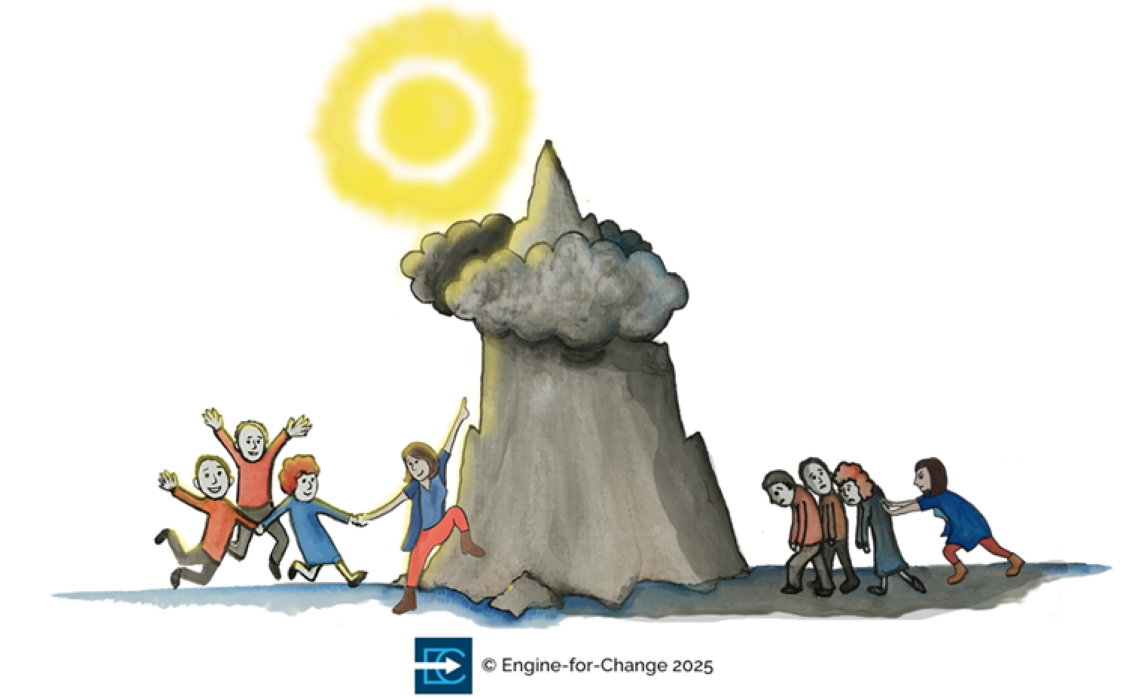Highlights and Insights from Coach Change™ 2024
The Coach Change™ 2024 conference brought together change management professionals and coaches eager to deepen their understanding of how coaching can transform organizations and drive change. For those who couldn’t attend, this overview captures the essence of the event, highlighting the rich techniques, inspiring speakers, and actionable insights shared throughout the day. Whether you’re a seasoned change practitioner or exploring the world of coaching, these highlights offer a window into a conference dedicated to enhancing your toolkit for leading change.
Key Highlights from the Sessions
1. Keynote Speech: Leadership Superpowers in Life’s Second Half by Aneace Haddad
Aneace Haddad, an executive coach with a transformative story of his own, opened the day by exploring how leadership evolves as we enter the “second half” of life. Aneace shared how coaching can unearth “leadership superpowers” that naturally emerge with experience and introspection. Through his own journey from tech CEO to executive coach, he illustrated how self-discovery and life transitions build deeper resilience, empathy, and “iron will,” qualities he refers to as superpowers essential to effective leadership.
“There’s a natural, organic emergence of leadership excellence with time,” Aneace noted, underscoring how this transition is not just about skills but about a deeper transformation of character.
2. Dima Syrotkin of Pandatron: Coaching and AI for Behavior Change
Dima Syrotkin, CEO of Pandatron, shared how artificial intelligence is revolutionizing the coaching landscape. His session focused on how AI-based coaching can drive behavior change within organizations by making coaching more accessible and scalable. Dima brought forward compelling statistics and case studies that demonstrated how AI coaching could facilitate rapid, widespread employee engagement.
Dima’s key message emphasized that integrating technology in coaching isn’t about replacing human connection but enhancing the reach and impact of coaching practices in today’s fast-paced business environment.
3. Robert Garcia on The Transformative Power of Coaching in Organizations
Robert Garcia, Vice President and Chief Staff Officer of ICF Coaching in Corporations, discussed how coaching brings transformational power to organizational culture and performance. He shared insights into how coaching leads to improved alignment between leadership and employees and fosters a culture of trust, agility, and open communication.
“Coaching is about unlocking potential, not just addressing performance gaps,” Robert stressed, highlighting the strategic role coaching plays in guiding leaders and teams through complex organizational changes.
4. Jennifer Britton on Group Coaching for Engagement and Alignment
Jennifer Britton, CEO of Potentials Realized and a recognized author on group coaching, presented a session on how group coaching can be a pivotal tool for engaging employees and aligning sponsor goals. She provided practical techniques for leveraging group dynamics to build a sense of community and shared vision, ultimately leading to deeper commitment to change initiatives.
“Group coaching isn’t just about group conversations; it’s about fostering a collective journey toward common goals,” Jennifer shared, urging practitioners to see group coaching as a cornerstone for team development and change readiness.
5. Paul Sherman on Team Coaching for Organizational Change
Paul Sherman, CEO of Team Coaching International, brought an interactive approach to exploring how team coaching facilitates organizational change. He encouraged participants to reflect on their best team experiences and identify the key elements that made those teams successful. Trust, shared goals, and constructive interaction were just a few of the themes that surfaced, emphasizing the power of team coaching in achieving high performance.
Paul described team coaching as making the unconscious conscious: “Your teams know what great teaming is. All we’re doing in a team coaching model is making the unconscious conscious in service of your change management initiative.”
6. Kurt Wolf and Barbara Van Hare on Blending Change Management and Coaching
Kurt Wolf and Barbara Van Hare, representing the ACMP/ICF Global Task Force, closed the day by discussing the synergies between change management and coaching. They shared practical guidance on how blending these two disciplines creates powerful outcomes for organizational transformations. Their talk underscored the idea that change management and coaching together empower a holistic approach to change, where processes and people are supported in tandem.
Key Takeaways for Change Practitioners
Throughout the conference, a consistent theme emerged: coaching is not just an add-on to change management but a key driver for achieving meaningful, lasting transformation. Techniques like AI coaching offer scalable ways to engage more employees, group and team coaching provide a platform for collective growth, and the blend of coaching with change management enables leaders to support their teams through both structural and cultural shifts.
Deepen Your Coaching Skills
If you found these highlights insightful and are eager to develop your coaching capabilities further, consider signing up for the Coaching Skills for Consulting Professionals program. This program offers an immersive opportunity to learn practical coaching techniques that can elevate your change management practice.
Stay tuned for future Coach Change™ conferences, including the 2025 event, which will continue to expand on these transformative coaching approaches.
Coach Change™ 2024 was a conference rich with insight, skill development, and inspiration. It provided a space for change management practitioners to explore how coaching can amplify their impact and foster lasting organizational change. Even if you missed the event, the principles and techniques shared continue to be relevant, offering a pathway to enhancing your work as a change leader.







